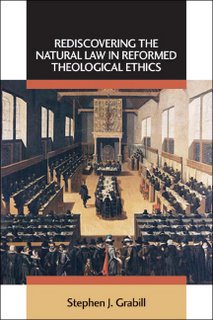
"I count it sufficient to have said that nothing may be found
in the world so abject or lowly that it gives no witness to God."
in the world so abject or lowly that it gives no witness to God."
This quote by the Reformed theologian Peter Martyr Vermigli from his commentary on Romans sets the stage for the ambitious work of Stephen Grabill in "Rediscovering the Natural Law in Reformed Theological Ethics." Grabill, a research scholar in theology at the Acton Institute foe the Study of Religion and Liberty, attempts to do exactly what the title suggests. In his own words, "a hybrid of historical and theological resources" this book contributes to the growing discussion and interaction of scholars with the issue of natural law and its corresponding doctrinal and ethical concerns.
With a narrow focus on the Reformed perspective, Grabill makes the case that the 20th century's approach to the matter of natural law - the idea that God has written upon the heart of all men a common rule of right and wrong - is an unfortunate detour from what has been a fairly consistent understanding since the early middle ages.
Grabill points to the 1934 debate on Natural Revelation between Reformed theological giants Karl Barth and Emil Brunner, as the pooint where the common understanding when off the rails. Barth, a strong opponent of any concept of natural law won the day and his antipathy toward the subject colored much of the discussion of the topic until recently. Now Grabill says that there is a growing interest in natural law again by Reformed scholars who see it as a way to discourse in the increasingly hostile court of secularity.
His contribution is this heavy annotated volume which serves to return to the sources of the reformed tradition and show that contrary to Barthian colored study, in fact the great voices of the past stand in continuity with the historical perspective on natural law. With that in mind, Grabill mines the depths of four of the foremost thinkers of the Reformation - John Calvin, Peter Martyr Vermigli, Johannes Althusis and Francis Turretin.
It is here with the historical and theological resources that this book finds it value. While most are familiar with John Calvin, the rest of the writers are less familiar, but nonetheless important to the discussion. Grabill does a good job of distilling their perspectives and answering their critics. The large amount of annotations found at the end of the book demonstrate that Grabill has understood these men and their thought.
As a Reformed pastor, I found this book interesting, but wonder about its appeal to the general public. It is not an easy book and I would imagine most laypersons would be put off by it. however, it is a great resource for scholars wanting to examine the roots of the historical reformed stance on the matter of natural law. And while I would have liked Grabill to draw some practical applications from his study, he admits that that is not his goal, he will leave that to others who will build upon this study. In summary I would give it a 4 on a 1-5 scale, but mindful that this score is for scholars who have the most to gain from reading this book.
With a narrow focus on the Reformed perspective, Grabill makes the case that the 20th century's approach to the matter of natural law - the idea that God has written upon the heart of all men a common rule of right and wrong - is an unfortunate detour from what has been a fairly consistent understanding since the early middle ages.
Grabill points to the 1934 debate on Natural Revelation between Reformed theological giants Karl Barth and Emil Brunner, as the pooint where the common understanding when off the rails. Barth, a strong opponent of any concept of natural law won the day and his antipathy toward the subject colored much of the discussion of the topic until recently. Now Grabill says that there is a growing interest in natural law again by Reformed scholars who see it as a way to discourse in the increasingly hostile court of secularity.
His contribution is this heavy annotated volume which serves to return to the sources of the reformed tradition and show that contrary to Barthian colored study, in fact the great voices of the past stand in continuity with the historical perspective on natural law. With that in mind, Grabill mines the depths of four of the foremost thinkers of the Reformation - John Calvin, Peter Martyr Vermigli, Johannes Althusis and Francis Turretin.
It is here with the historical and theological resources that this book finds it value. While most are familiar with John Calvin, the rest of the writers are less familiar, but nonetheless important to the discussion. Grabill does a good job of distilling their perspectives and answering their critics. The large amount of annotations found at the end of the book demonstrate that Grabill has understood these men and their thought.
As a Reformed pastor, I found this book interesting, but wonder about its appeal to the general public. It is not an easy book and I would imagine most laypersons would be put off by it. however, it is a great resource for scholars wanting to examine the roots of the historical reformed stance on the matter of natural law. And while I would have liked Grabill to draw some practical applications from his study, he admits that that is not his goal, he will leave that to others who will build upon this study. In summary I would give it a 4 on a 1-5 scale, but mindful that this score is for scholars who have the most to gain from reading this book.
No comments:
Post a Comment